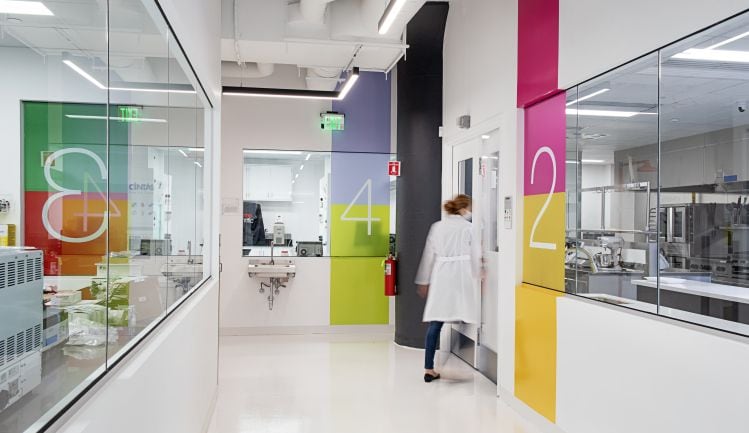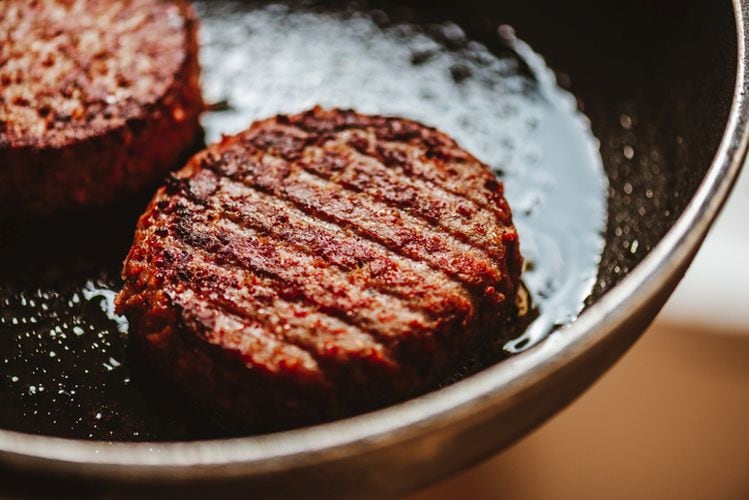According to a GRAS determination submitted to the FDA and now available to view on the FDA website, the protein is myoglobin, a heme-binding protein found in the muscle tissue of cows that Motif is expressing in a genetically engineered yeast strain.
The myoglobin preparation (supplied as a frozen liquid) is intended for use at inclusion rates of ≤2% to “mimic flavors associated with cooked ground meat” in fresh or frozen plant-based burgers, patties, sausages, and other meat analogs.
The primary function of the myoglobin in food is for flavor, but as it imparts a red color when exposed to oxygen, a color additive petition has also been submitted to the FDA, said Boston-based Motif, which ha just received a coveted 'no questions' letter from the FDA in response to its determination that HEMAMI is generally recognized as safe (GRAS).
It can be labeled ‘myoglobin’ or ‘natural flavor’
As for labeling of the ingredient, “To establish how our ingredient would be labeled in the ingredient list, we have concluded that our product could be labeled ‘myoglobin,’ or ‘natural flavor,’ and we believe labeling will regulations support that," says the firm.
Asked whether firms using it would trigger a bioengineered food label, as low level residues (≤0.2 mg/L) of native proteins from the fermentation organism are expected to be present in the myoglobin preparation, a spokesperson said: “Yes, at this point we have been told that the product - because it has detectable DNA from the yeast used for fermentation - would require that customers using the ingredient would label under the new National Bioengineered Food Disclosure Standard [effective Jan 2022].”
“Plant-based foods have the potential to drive a more sustainable future, but that doesn’t matter unless people actually eat them. HEMAMI enables a whole new taste and experience level for meat alternatives that a wider group of plant-based and flexitarian consumers will crave.” Jonathan McIntyre, CEO, Motif FoodWorks
The production process uses a yeast that’s widely used for production of recombinant proteins and food enzymes, including Impossible Foods’ flagship ‘heme’ protein
So how is it made? According to the GRAS notification, the ingredient is a liquid flavoring preparation containing myoglobin produced by fermentation from a modified strain of the yeast Pichia pastoris expressing the myoglobin gene from Bos taurus [ie. cows].
P.Pastoris is widely used for production of recombinant proteins and food enzymes, including Impossible Foods’ flagship ‘heme’ protein, noted Motif. “The P. Pastoris NRRL Y-7556 host strain is from the same lineage as P. Pastoris NRRL Y-11430, which served as the host organism for production of soybean leghemoglobin by Impossible Foods.”
To produce the myoglobin, a synthetic gene encoding for bovine myoglobin was inserted into a wildtype strain of P. Pastoris yeast, and is the only non-native gene present in the production strain, explained Motif. “It has been confirmed by bioinformatics to not confer any pathogenic, virulent, or toxigenic factors to the production strain.”
The production strain does not contain any plasmids or antibiotic resistance genes, as confirmed by phenotyping and whole genome sequencing of the production strain, meanwhile.

Powered by Ginkgo Bioworks' bioengineering platform, Motif FoodWorks is focused on high-impact ingredients that can be added to plant- based meat and dairy formulations in small quantities but make a significant difference to the eating experience.
The Boston-based firm, which recently raised $226m in Series B funding, bringing its cumulative funding to $345m, plans to open a new 65,000sq ft facility in Northborough, MA, in 2022, featuring an R&D center and three pilot plants for fermentation, ingredient, and finished-product production.
The facility, which will make HEMAMI and Motif’s new texture technology APPETEX (launching early next year), will house up to 100 employees and new food-technology, analytical, and bioprocessing labs.
‘The protein itself has a long history of safe consumption in the human diet’
So is it safe?
Given that the myoglobin in Motif’s preparation is “100% identical to bovine myoglobin” it has a “long history of safe consumption in the human diet,” explained Motif.
“To date, there have been no reports of adverse effects following consumption of bovine myoglobin.”
Meanwhile, “Assuming that the proposed food uses of myoglobin in meat alternative products would substitute for various meat products on a 1:1 basis, the introduction of Motif FoodWorks’ Myoglobin Preparation to the U.S. marketplace would not change background intakes of myoglobin in the U.S. population.”
It added: “Motif FoodWorks has demonstrated that the production strain (NRRL Y-7556) is homologous with the strain host (NRRL Y-11430) used for the manufacture of soybean leghemoglobin described by Impossible Foods in GRN 737 and therefore is from a safe strain lineage with a history of food use.
“Motif FoodWorks also has characterized the identities of the major proteins originating from the production organism and identified these proteins as functionally involved in innocuous biosynthetic and housekeeping proteins necessary for productive growth of the organism. Motif FoodWorks has therefore concluded that the Myoglobin Preparation is produced by a safe strain lineage and the presence of low-level residues of Pichia cell matter in the Preparation are not of toxicological significance.”
Motif CTO: ‘This is something that's being offered for the first time in the industry, so we're very excited’
Speaking to FoodNavigator-USA about the significance of this ingredient in the world of meat alternatives in September, Motif CTO Dr Mike Leonard said: “Our myoglobin is identical to the myoglobin you find in muscle tissue of cows and provides that meaty flavor, aroma, and that sort of umami flavor experience you expect from real meat. And this is something that's being offered for the first time in the industry, so we're very excited.”
So how does Motif’s myoglobin compare to Impossible Foods’ soy legehemoglobin, which the company has said ‘makes meat taste like meat’?
“It's a different protein,” said Leonard. “The operative property is that it binds iron, and brings all the benefits from a sensory standpoint that come with that. It has a unique flavor profile that provides a very authentic meaty experience. It's the same protein you find in muscle tissue of cows.”
Consumer testing: 'Tremendous' feedback
The ingredient has been tested with consumers with exciting results, said Leonard.
“The feedback we've received has been really tremendous; we're a b2b company but we go all the way to finished product design, because that's the best way to showcase how our technology really provides a benefit for consumers.
“So we’ve run four events. The first was a traditional focus group that we ran in Ohio back in March. We had 40 consumers over a period of about a week to sample a burger [featuring Motif’s myoglobin and a new texturizing ingredient it plans to launch next year] and compare it to products that are on the market today, and our prototype scored high on all the target attributes, flavor, juiciness, texture, appearance…
“The data we got back were pretty striking. 73% of core client base consumers in that group preferred our burger over 80:20 beef and 63% preferred our prototype over leading retail brands.
“We’ve also partnered with a company called Coolgreens, a healthy restaurant franchise in Texas, which put our prototype product on their menu for a limited time, and it performed really well.”
Labeling: Is it vegan?
So what about positioning and messaging?
As this is ‘animal-free’ bovine myoglobin (that is, it’s made without animals), you can make a strong argument that it is vegan, a term not defined in food labeling laws in the US. But will hardcore vegans want to eat something that is effectively identical to a cow protein, and could it scupper the ‘plant-based’ credentials of the products that feature it?
“There's always going to be people who will have their own opinions about this, but from a claims standpoint, we're very confident that inclusion of this ingredient will preserve a vegan claim for a customer. There’s no direct animal provenance, it’s not based on an animal source.”
APPETEX plant-based texture ingredient promises 'springiness, juiciness and bite associated with animal-based connective tissue'
Motif’s new texture technology APPETEX - launching early next year - is a hydrogel combining plant-based proteins and carbohydrates that Motif claims can replicate the "springiness, juiciness and bite associated with animal-based connective tissue."
APPETEX will be supplied in the form of small, dried pellets which expand when hydrated, said Motif head of food science Dr. Stefan Baier. "APPETEX swells when it hydrates and becomes harder in contrast to the plant-based protein in the food."
"When you bite into a [conventional] beef patty, it is moderately hard with springiness in the first bite, and it forms large non-uniform particles in the mouth during chewing," added Dr. Dilek Uzunalioglu, head of food applications, who said consumers often describe plant-based burgers as "dry and lacking moisture, as well as being mushy in having a uniform texture that does not come anywhere close to the experience of eating a typical beef patty."

